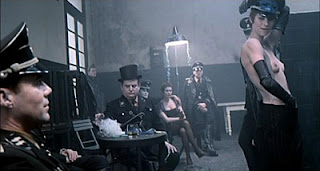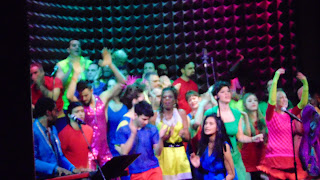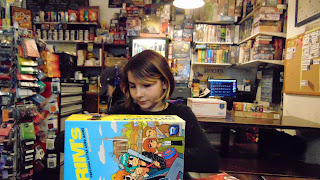 |
| Scenes from the Reverend Billy and the Church of Stop Shopping, the East Village, and Luchino Visconti's 1969 film, The Damned,as fascism slowly envelops a family and a country. |
It was a weird week. Getting back from DC, ACT UP
had planned a few world aids day actions.
Remembering what was, silent screams and lost
friends, that’s what the day is all about.
ACT UP unfolded a banner declaring: “BIGOTRY SPREADS AIDS!” at Times Square.
It felt like an apt message, especially with the ravages of the tax bill making
its way through congress.
Throughout the weekend, we wondered what was going
on, as this moment of history lingered, and we wondered what the hell was
coming of this country, taxes going up for the poor, down for the super-rich,
and hard won social programs on the chopping blocks.
What form was this going to take?
Discussing Victor Frankyl on Sunday, Joannie read a
post from a friend:
Dear Friends:
Today
is World AIDS Day. It is a day to remember all of the men and women who have
died since its outbreak as a fatal disease in 1981, to be aware of the millions
worldwide (including me and Ira) who are living today with AIDS as a chronic illness,
and to pray for a cure in the future. I am one of the lucky ones. I have been
living with this illness for 33 years. I was officially diagnosed in 1985. I
have been hospitalized with near-fatal pneumonia twice: 1994 and 2010. Since
1996, I have been taking powerful daily medications that have kept me alive
with insidious side effects that constantly affect my mental and physical
state. I am grateful but tired! I long for a day when I can throw those pills
away. But like I said, I'm one of the lucky ones. My "viral load" is
undetectable. My "t cells" are stable. That means I can work. I can
play. I can stay on this planet. If I take my pills every day I can live to an
age unimaginable in 1985. So I take my medicine and try to do the best I can
every day and not dwell on it. But today, World AIDS DAY, 2017, I am dwelling
and yelling:
HEY,
CONGRESS! ARE YOU REALLY GOING TO PASS A BILL TODAY THAT WILL RAISE TAXES, CUT
MEDICAID AND TAKE AWAY DISABILITY INSURANCE FROM PEOPLE LIVING WITH AIDS,
CANCER, DIABETES, ETC? REALLY???? TO GIVE A TAX BREAK TO YOUR DONORS?
REALLY????? ON WORLD AIDS DAY? OK. GO AHEAD. MAKE MY DAY AND MAKE THIS DAY
STAND FOREVER AS PROOF THAT YOU CARE ABOUT NO ONE BUT YOURSELVES. AND MAY YOUR
VOTE STAND AS A SYMBOL OF CRUELTY AND HYPOCRISY - FOREVER!
I
will stop yelling now. I will go back to remembering and praying and living
through this day as best I can. And you, my friends, may you do the same today
and every day. And thank you for reading this.
L, P.
Earlier in the day, a few of my comrades from ACT UP
and Rise and Resist had taken in the Reverend Billy for World AIDS Day at Joe’s
Pub. It was a joyous moment to celebrate
the fight, applaud and howl, sing and scream. Choking up remembering old friends, Savitri
pulled a few of us who were arrested on Tuesday onto stage to both pray for the
dead and fight like hell for the living.
That was a theme all weekend long. It was part of the sentiment at our New
Caucus union meeting Saturday, our reading group from the Institute of the
Radical Imagination on Saturday, watching the assault on the poor take
countless forms in the new tax bill.
We all seemed to know that the tax bill was part of
the republican playbook, spend down the coffers when in power, leaving deficits,
so the next democratic administration is hamstrung with debt unable to create
their own programs. Reagan and Bush did it, leaving little room for Clinton to
maneuver when he came into power; Bush
did it, leaving Obama with little room to move.
And Trump is doing it. No matter
how long he is in power, he’s leaving a mess for the next administration. And we keep on buying it.
My old mentor Stanley Aronowitz calls this the moronization
of American political discourse.
Dialectics is about the movement of history, he
explained. The movement of history is the guiding thread to enable us to grasp
human beings and their social activities.
Stanley lead us through a rousing reading of Adorno’s
1958 Introduction to Dialectics.
We concentrated on lecture nine, in which Adorno
recalled a memory of Walter Benjamin. “I am going to say something scientific
now,” noted Stanley. “He generally thought of Benjamin as the cat’s piss. He
was generally admiring. But his admiration did not extend to his anarchism.” Without
a university home, Benjamin freelanced for much of his adult life, hanging out with
Brecht, researching the archades. Adorno dragged his feet in recommending Benjamin
for a position at the Warburg Institute in London. Benjamin and Adorno
continued to correspond. But as the
world grew dark, Benjamin fled Paris but it was too late, eventually
killing himself in Spain in September of 1940.
In the years before, Benjamin and Adorno had corresponded
about his writings, sharing articles. When
Benjamin showed Adorno a draft of his essay on Baudelaire, Adorno took Benjamin
to task, noting, “your dialectic is lacking one thing: mediation….The materialist
determination of cultural traits is only possible if it is mediated through the
total social process.”
Two lectures earlier he had warned that the dialectic
is not a simple mechanistic formation.
I guess we all could do well to think this way, moving
beyond old forms, looking at the total social process, as we consider our moment
in history. There is a complicated relationship between the individual and the
whole. Individual experience is always mediated by social experiences. This is part of being alive.
We write stories, protest, scream and search for
meaning.
We tell our stories.
Yet are we engaging the total social process? Is there still room for us to improvise, to
engage and challenge ways of thinking, protesting, and taking on power? Are our efforts, our actions, up to the task for the challenge we face?
Watching the right move in the US, I wonder if I would
do any better than Victor Frankyl did?
Watching the descent of a family into fascism in The Damned, considering Benjamin’s
flight, I wonder if we have similar trajectories in front us?
I still think there is meaning in struggle. New forms seem less important than authentic engagement.
And in this respect, there is ample supply.



























































No comments:
Post a Comment